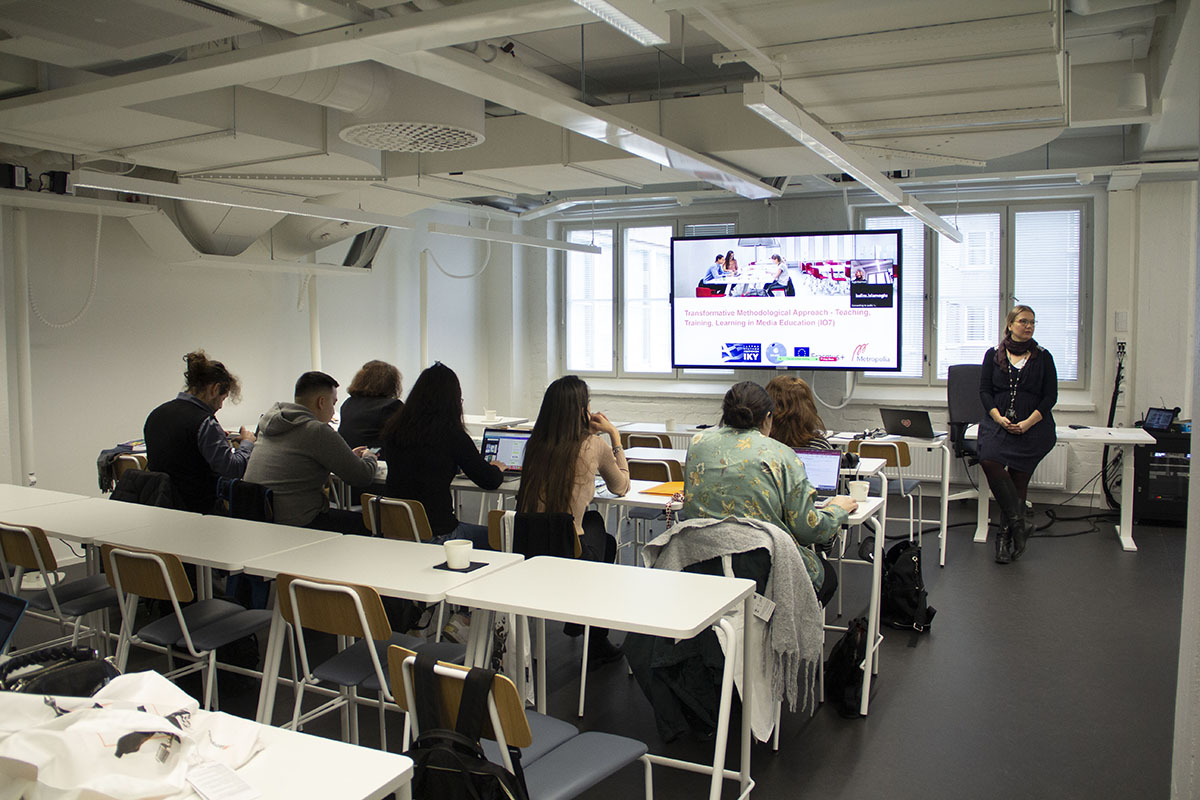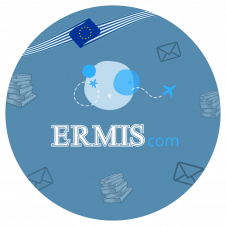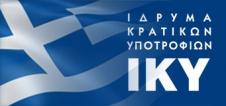ERMIScom (Common curricula for diversity: education in media and integration of vulnerable groups) aspires to develop a common curriculum among involved Higher Education Institutions (HEI) aiming to enhance the efficacy of media courses to counter fake news and hate speech spread online on social media in order to facilitate the social integration and inclusion of vulnerable social groups. The project consists of a range of Work Packages and Intellectual Outputs.
In the project, Metropolia is the leader of Intellectual Output 7, Transformative Methodological Approach: Teaching, Training, Learning. The specific IO is under the leadership of Metropolia University of Applied Sciences, due to its strong expertise in modern teaching & e-learning methods. Metropolia holds interactive & collaborative learning at the center of its educational approach, & aims to provide an enriching & constructive student-oriented culture in diverse learning environments.
Project background and objectives
Nowadays social media constitute the most powerful tool in reporting current socio-political themes such as integration and inclusion policies worldwide. Through their social network, they have the potential to facilitate the integration and inclusion of vulnerable social groups in the social milieu of Europe. Unfortunately, social media instead of combating discrimination, is many times the origin of fake news and hate speech, which aggravates this situation.
Education of journalists and social media professionals is the decisive factor of whether social media would become the driving force of integration or the agent giving floor to prejudices and stereotypes. Therefore, universities need to be equipped with a curriculum that can enable graduate students aiming to work in the field of journalism and social integration, as well as in PR departments or public institutions to promote European values of democracy, justice, human rights, dignity, European citizenship and strong institutions.
Hence, the main objective of this project is to tackle skills gaps in the field of journalism and social media by developing a curriculum, which will provide students with the skills and competences to adequately research and report on social inclusion and integration related topics, while at the same time countering and combating stereotypes, prejudices, racism, xenophobia and anti-migrant sentiments and informing about possibilities in regards to social entrepreneurship, social economy and social innovation, which will enable the promotion of social integration values and support integration efforts.
The long term aim of this project is to change the society’s mindset and to create an inclusive society, free from discrimination and radicalisation, which will be in the position to develop and grow in a sustainable and democratic living environment.
Partners
News
ERMIScom, an Erasmus+ project promoting Education in Media and Integration of Vulnerable Groups
In our rapidly evolving and increasingly intricate globalized world, it is more crucial than ever to take decisive actions that prevent discrimination, ensure equal access to goods and services for all individuals, and cultivate a truly inclusive society that upholds the human rights of vulnerable groups. These endeavors are essential to promote fairness, justice, and harmony among diverse populations.
To address these pressing challenges, the Erasmus+ European program has provided funding and support for the development of educational materials under the ERMIScom project, specifically focusing on "Common curricula for diversity: education in media and integration of vulnerable groups". These materials have been presented as the eighth Intellectual Output, utilizing an engaging Power Point format that showcases the culmination of this endeavor—a collection of seven digital books.
The creation of these educational resources has been a collaborative effort, bringing together distinguished scientists, professors, and researchers from various higher education institutions involved in the university partnership project. These esteemed institutions include Bahçeşehir University in Turkey, Metropolia Ammattikorkeakoulu in Finland, the University of National and World Economy in Bulgaria, Vrije Universiteit Brussel in Belgium, and the NGO E.K.O. in Greece. The authors of the seven e-books, now available online to anyone interested, hail from diverse fields of expertise, each contributing their unique perspectives and insights on critical topics such as discrimination, stereotypes, prejudices, fake news, hate speech, European social policy actions, research, application of social entrepreneurship, and innovative teaching and learning methods for students and teachers. Through their collective work, they aim to encourage critical thinking and promote a holistic understanding of these subjects.
In addition to the digital books, the ERMIScom project has also developed a valuable complementary resource known as the ERMIScom Addendum. This Addendum represents a horizontal deliverable, aligning with the consortium's objective of incorporating innovative teaching practices and non-formal education methods into the new curriculum. It serves as a compilation of 60 activities, designed based on the principles of non-formal education. This resource transcends the boundaries of formal education settings and extends its utility to non-formal education workshops and other learning activities. As a result, the ERMIScom Addendum becomes an invaluable asset for students, educators, and media professionals alike, providing them with a rich source of ideas, strategies, and approaches to foster inclusive learning environments and promote diversity awareness.
In summary, in our dynamic and interconnected world, the need to combat discrimination, ensure equal access, and create an inclusive society is of paramount importance. The ERMIScom project, supported by the Erasmus+ European program, has produced educational materials and a complementary resource—the ERMIScom Addendum—that empower individuals to think critically, embrace diversity, and contribute to the realization of a more equitable and inclusive future.
The e-books and the Addendum are each assigned a unique title and International Standard Book Number (ISBN) for identification purposes. The titles and ISBNs for each of these resources are listed below:
- IO1 BOOK: STEREOTYPES & PREJUDICES: XENOPHOBIA & RACISM (ISBN 978-960-466-305-7)
- IO2 BOOK: FAKE NEWS & HATE SPEECH REPRESENTATION OF VULNERABLE SOCIAL GROUPS IN THE MEDIA (ISBN 978-619-232-691-3)
- IO3 BOOK: SOCIAL ENTREPRENEURSHIP AND VULNERABLE SOCIAL GROUPS, National and Kapodistrian University of Athens Press (ISBN 978-960-466-282-1)
- IO4 BOOK: VULNERABLE GROUPS AND TRAUMA, National and Kapodistrian University of Athens Press (ISBN 978-960-466-281-4)
- IO5 BOOK: INTEGRATION POLICIES FOR VULNERABLE SOCIAL GROUPS AND THE MEDIA (ISBN 978-960-466-308-8)
- IO6 BOOK: FUNDS AND GRANTS: SOCIAL INTEGRATION AND RIGHTS RELATED PROJECTS (ISBN 978-619-232-689-0)
- IO7 BOOK: TRANSFORMATIVE METHODOLOGICAL APPROACH - TEACHING, TRAINING, LEARNING (ISBN 978-960-466-307-1)
- https://ermiscom.media.uoa.gr/fileadmin/depts/media.uoa.gr/ermiscom/uploads/ERMIScom_Addendum_and_Annex_ISBN_rz.pdf
The educational material created within the framework of the ERMIScom project serves a dual purpose. Primarily, it is designed for students and teachers who may participate in a prospective Erasmus Mundus master's program, which could be developed in collaboration with the partnering universities. This material is tailored to cater to the specific needs and interests of these individuals, offering them valuable insights and resources to enhance their learning experience.
However, the significance of this educational material extends beyond the confines of a single program. The topics covered in the material are inherently interdisciplinary, encompassing a wide range of subjects. As a result, they have relevance and applicability to numerous other educational programs and disciplines. For instance, the material focuses on media literacy training, equipping learners with the necessary skills to critically analyze and navigate the media landscape. It also delves into various means and techniques employed by communication studies professionals to present information in a compelling and engaging manner.
By addressing these broader themes, the educational material becomes a rich source of knowledge and information for individuals pursuing diverse fields of study. Whether it be students and educators in related academic programs, professionals in the communication industry, or individuals interested in gaining a deeper understanding of media literacy, the material offers valuable insights and resources to a wide audience.
Within the framework of ERMIScom, several complementary activities were implemented to foster collaboration among the project partners and further strengthen the consortium. These activities played a crucial role in maximizing the collective expertise and resources of the participating universities and organizations. The following activities were undertaken as part of this collaborative effort:
- Three Transnational Partner Meetings (two in ATHENS, GREECE and one in SOFIA, BULGARIA) for setting common specific milestones, monitor the progress of the project`s deliverables and evaluate and optimize management parameters.
- Two Learning, Teaching, Training Activities (LTTs), and in particular: (a) a 9-day Intensive program for Higher Education Learners “Media Education for Diversity” in ISTANBUL, TURKEY, which was the first opportunity during the project’s life-cycle to test all IOs in a joint manner, simulating the whole master curriculum in an intensive & interdisciplinary way and (b) A 7-day Blended Mobility for Higher Education Students “Applying New Methodologies in Media Education for Diversity” in HELSINKI, FINLAND, which equipped participants with digital skills & competences with new media & interactive journalism tools, and gave the opportunity to review the modules after the piloting period.
- Three Multiplier Events: A Mid-Term and Final Conference, in ATHENS, GREECE, and a Cross-Interaction Event among policymakers, academia, media professionals, civil society and vulnerable social groups in BRUSSELS, BELGIUM
The coordination of the ERMIScom project was entrusted to the esteemed Communication and Media Studies department of the National Kapodistrian University of Athens. Under their guidance and leadership, the project successfully came to fruition, resulting in the creation of seven e-books and a Companion of Non-Formal Education Methods and Activities.
These valuable resources, which encapsulate a wealth of knowledge and insights, have been made accessible to the public through the dedicated project website: ermis.com.uoa.gr. The website serves as a repository for these materials, allowing individuals from around the world to access and benefit from the educational content developed as part of ERMIScom.
A heartfelt appreciation is extended to the authors who contributed their expertise, research, and experiences to the creation of the e-books and the Companion. Their dedication and valuable insights have enriched the educational material, making it a comprehensive and enlightening resource.
Furthermore, recognition is owed to the coordinators of the e-books, who played a pivotal role in ensuring the seamless compilation and organization of the content. Their meticulous efforts have contributed to the overall quality and coherence of the educational material.
Gratitude is also expressed to the scientific and administrative staff of the participating universities, whose unwavering support and commitment have been instrumental in the successful implementation of the ERMIScom project. Their collaboration and collective efforts have laid the foundation for the project's achievements.
Last but not least, special thanks are extended to the Greek National Agency for the Erasmus+ programme, as well as their dedicated staff. Their financial support and continuous assistance throughout the project's execution have been invaluable, enabling the realization of ERMIScom's goals and objectives.
Together, the coordination team, authors, coordinators, university staff, and the Greek National Agency have played significant roles in bringing the ERMIScom project to life, fostering inclusive education, and promoting diversity awareness through the dissemination of high-quality educational materials.
The coordinator of the Project ERMIScom
Dr. Savvatou Tsolakidou
Intellectual Output 7 book published
The book Transformative Methodological Approach - Teaching, Training, Learning (ISBN 978-960-466-307-1) has been published on ERMIScom project website where it can be downloaded in pdf format:
Senior Lecturer Aura Kaarivuo from Metropolia University of Applied Sciences is the book's Scientific Coordinator and has edited the book with Senior Lecturer Sami Huohvanainen, also from Metropolia UAS.
"This book of Intellectual Output 7: TRANSFORMATIVE METHODOLOGICAL APPROACH: TEACHING, TRAINING, LEARNING aims to share the knowledge and experiences gained during the ERMIScom project. The chapters give an overview of every IO topic from the researchers and offer perspectives on how these topics could be taught and learned".
Contents of the book
- CHAPTER 1: Constructivism and meta-cognitive skills in learning
- CHAPTER 2: Collaborative learning and interdisciplinarity in higher education
- CHAPTER 3:HOW TO APPROACH COMPLICATED TOPICS IN A MEDIA CLASS: STREROTYPES AND PREJUDICES
- CHAPTER 4: FAKE NEWS & HATE SPEECH: REPRESENTATION OF VULNERABLE SOCIAL GROUPS IN THE MEDIA
- CHAPTER 5: A NAVIGATION CHART FOR TEACHERS AND TRAINERS TO LEVERAGE ENTREPRENEURIAL UNIVERSITIES FOR SOCIAL ENTREPRENEURSHIP
- CHAPTER 6: TEACHING AND LEARNING METHODS APPLIED ON THE MODULE “VULNERABLE GROUPS AND TRAUMA”
- CHAPTER 7: TEACHING AND LEARNING METHODS APPLIED ON THE MODULE “SOCIAL POLICIES FOR VULNERABLE GROUPS AND THE MEDIA”
- CHAPTER 8: TEACHING AND LEARNING METHODS APPLIED ON THE MODULE “Management of projects in the field of migration and refugees”
- CHAPTER 9: Lifelong Learning and Digital Learning
Authors
- Sami Huohvanainen
- Aura Kaarivuo
- Sinan Asci
- Tirse Erbaysal Filibeli
- Stella Angova
- Ivan Valchanov
- Maria Nikolova
- Jason Roncancio
- Nikolay Dentchev
- Savvatou Tsolakidou
- Mike Tastsoglou
- Stavros Protopapas
- Daniela Stoyanova
- Nadya Mironova
Metropolia UAS attends the final seminar in Athens
ERMIScom project's final seminar is held in National and Kapodistrian University of Athens' Department of Communication and Media Studies on February 6–7, 2023.
Lecturer Sami Huohvanainen and project coordinator Jussi Linkola from Metropolia University of Applied Sciences are attending the seminar and presenting the results that Metropolia has co-created with other project partners.
Yesterday Sami Huohvanainen presented the soon to be finished book from the project's Intellectual Output 7, Transformative Methodological Approach: teaching, training, learning: Teaching, Training, Learning. Sami also participated a panel under the topic Closing the skills gap between education and the labour market in a Volatile, Uncertain, Complex and Ambiguous (VUCA) social environment.
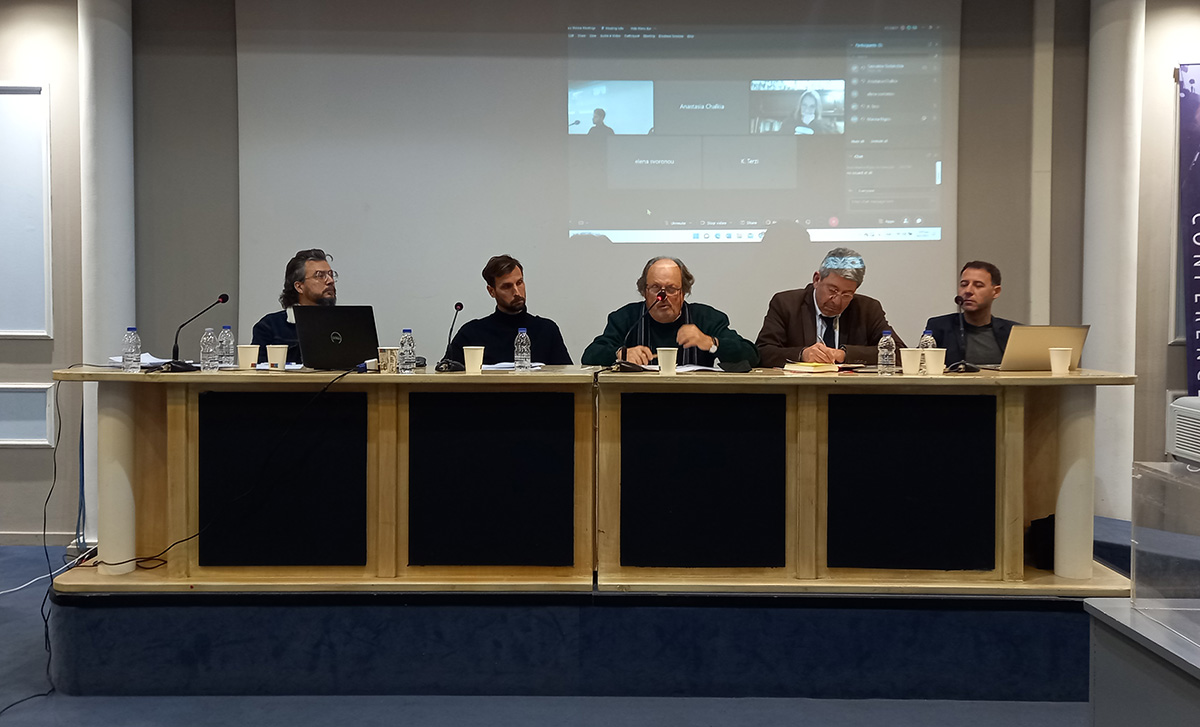
Panel: Closing the skills gap between education and the labour market in a Volatile, Uncertain, Complex and Ambiguous (VUCA) social environment, Sami Huohvanainen of Metropolia on the left.
More information about the seminar:
The last Conference entitled “New Media and Vulnerable groups” of the ERMIScom project will be hosted on February 6 and 7, 2023, at the Cultural Centre of Municipality of Athens, the Auditorium “Antonis Tritsis”, 50, Akadimias str, Athens - Greece. This two-day event aspires to attract participants from various sectors (HEI teaching staff, students, researchers, public servants, representatives of regional and local authorities, of NGOs and media and communication agencies, etc.) and to tackle subjects related to social integration of vulnerable groups, skills gaps and mismatches in journalism and social media, disinformation and fake news in media coverage, EU funding landscape and policies to ensure equal integration opportunities of specific vulnerable groups.
Participant's experiences on International Learning, Teaching & Training workshop week in Helsinki
ERMIScom International Learning, Teaching & Training workshop week was held between 14th and 19th of November on Metropolia University of Applied Sciences Arabia’s campus. The goal of the short course was to pilot and test all of the IOs in a joint manner, simulating the whole master curriculum in an intensive & interdisciplinary way. The participants of the course were the Professors from several universities around Europe, who have been creating the curriculum and teaching materials for the ERMIScom project, and their students from the universities. During the week the Professors held lectures and group exercises concerning the IOs and involved the students in the discussions by letting the students show their interests and knowledge through presentations and open discussions in the classroom. After the official lectures there were organized voluntary freetime activities held for every day of the week.
From a student’s point of view the ERMIScom International Learning, Teaching & Training week was very eye opening when it comes to studying and working in a modern field of media. Diversity and inclusivity are as large of a branch of industry as they are still lacking in the modern workplaces. It feels like the vulnerable groups are being talked about a lot, yet concrete actions are seen very little. During our visit to Finnish Journalist Union and Vikes it was very lovely to learn that especially Vikes is doing a lot to include vulnerable groups in media all around the world. Our visit gave me confidence and trust for a more emphatic and diverse field of media.
Lecturer Aura Kaarivuo is teaching the participants of ERMIScom's participants.
Doing group exercises and having discussions with the other students as well as the teachers in the ERMIScom group was also very motivating as well as heart warming. Even though we didn’t share the same mother language we all had the same concerns about the vulnerable groups and diversity in our home countries as well as in the whole world. It was truly motivating to work in an environment where everyone had the same passion towards the matters and were sharing knowledge freely and without preconceptions. I had many eye opening conversations even after the lessons with students from other countries while we were seeing the beautiful yet cold center of Helsinki.
Having workshops and courses such as ERMIScom International Learning, Teaching & Training is very needed in university studies. Especially in media studies since media is the people’s way to communicate, inform and share - and it wouldn’t be that if it didn’t also include the people in more vulnerable positions. I’m thankful for the opportunity to get to know all the wonderful people attending this workshop and to get to learn and discuss today’s important matters.
Anna Myyryläinen, Film and television student, Metropolia UAS
Metropolia UAS piloting Intellectual Output 4
Senior Lecturer Aura Kaarivuo from Helsinki Metropolia University of Applied Sciences gave a lecture as a part of an online piloting course for ErmisCOM-project’s fourth Intellectual Output (IO4) “Vulnerable groups & Trauma”.
The lecture took place as an online seminar on Dec 15th 2021. Kaarivuo’s subject was “Media coverage of vulnerability”, in which she covered issues such as representation of vulnerable groups and concept of inclusive media.
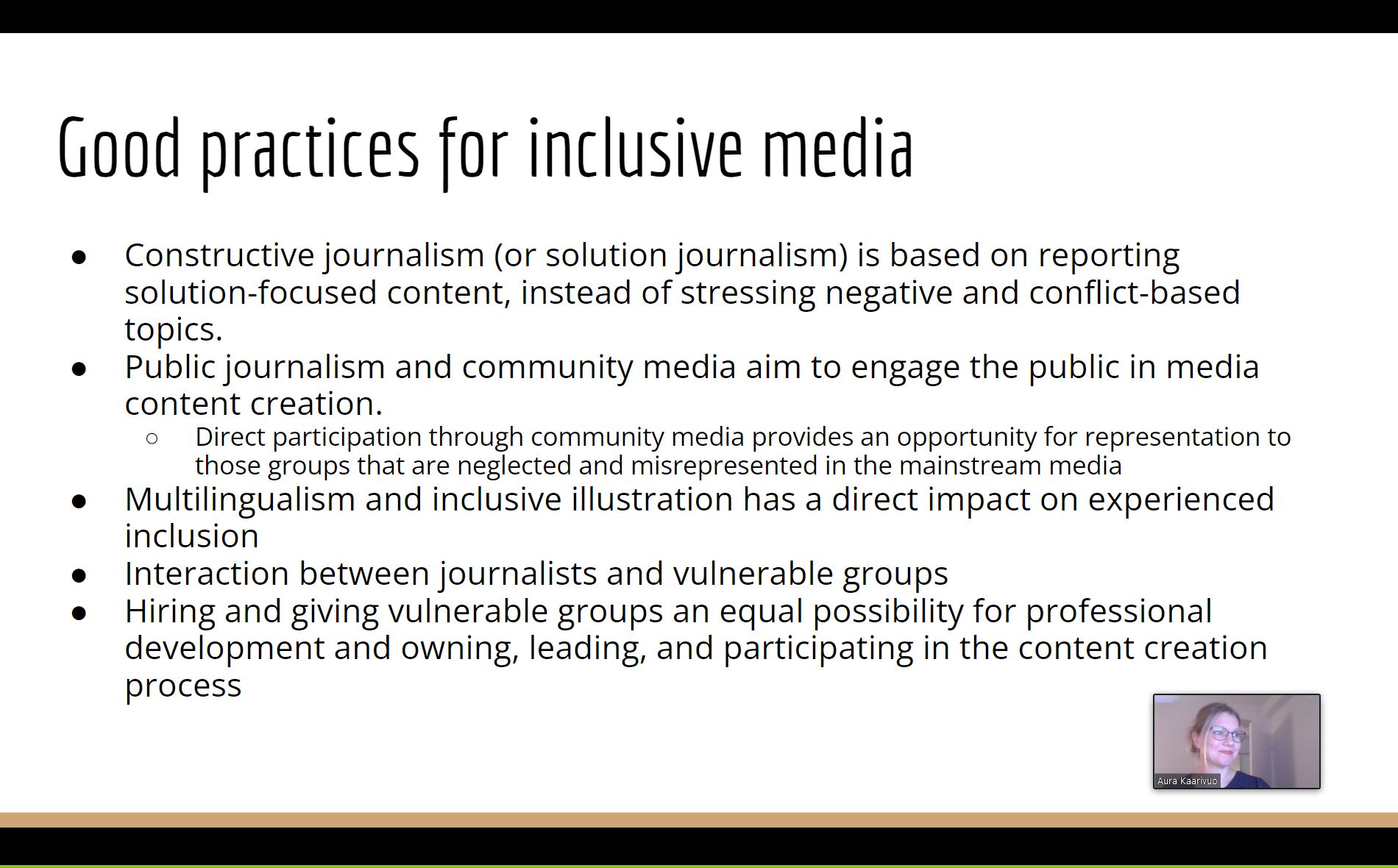
The course was attended by 16 students of the The National and Kapodistrian University of Athens Master's degree program of Communication and refugee/migration flows.
The online pilot lecture was a part of a common seminar organized by ErmisCOM project lead The National and Kapodistrian University of Athens and was coordinated by prof. Georgios Pleios.
Prof. Tirşe Erbayal from Bahçeşehir University, Istanbul, was another lecturer on Dec 15th with the topic “Media coverage and fake news on vulnerable groups”.
ErmisCOM project has almost completed the piloting phase of Intellectual Outputs 1-4. Partner institutions responsible for each IO will collect feedback from pilot courses and IO’s will be developed and finalized according to the feedback. IO’s 1-4 will be finalized by the end of March 2022. IO’s 5-7 are in the writing phase at the moment and they will proceed to piloting phase during 2022.
Contact information
Aura Kaarivuo
Senior Lecturer
Profile in Metropolia People Finder

